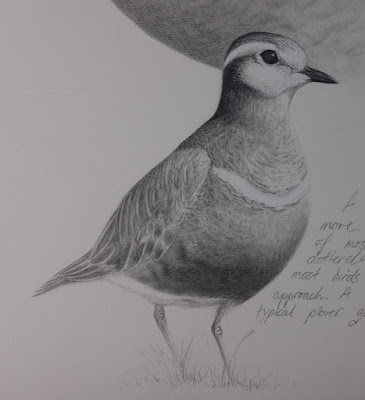Well a big apology for the distinct lack of blog updates. Running a small family business takes up a lot of my working week, and unfortunately at this present moment, my Artwork has to fit in with my limited free time. Spring is also my favourite month of the season, with new life emerging and the land blooming, it's the perfect excuse to be spending time outdoors and gathering a wealth of reference material for the cold months ahead. I'm very privileged to live in a beautiful part of the world. It holds a great array of wildlife and you would be hard-pressed to surpass it. This season I have been gathering data from 3 very rare and important bird species, which in the UK need all the help available if we are to save at least two of them becoming extinct. I will return to these species later in the year, but more recently on the Artwork front I have been tying to catch-up with many interesting commissions, along with a few study pieces and sketches to keep the graphite flowing when time permits.
This blog is about a very beautiful bird that seems to evade the main headlines for most avian lovers, one that has adapted to some of the harshest barren conditions, the Dotterel. It is many years since I last observed this charismatic bird and I have always enjoyed it not just for its beauty, but for the cheeky character it radiates. This A2 size study piece is for an important wildlife photographer who has spent many hours observing them, so it's always a pleasure to put together a piece for someone who knows the species well; casting a keen eye over my work for likeness and accuracy. The dotterel is a smallish sized bird around 8" tall with bold markings. Its white cheeks and blackish/brown crown, with a brown/beige chest and whitish breast-band help separate the beautiful chestnut lower breast and flanks, which lead into a black under belly. The Dotterel really is a stunning bird and its colours blend perfectly with the highland landscape. The main focus of the piece is the bird in colour on the right-hand side of the board; I used pastel pencils to show the magnificent colours of the species, which Graphite could not depict. The rest of the study hopefully captures the upright stance of the bird, with its prominent rotund posture highlighting the most wonderful outline when silhouetted against a skyline
Because they favour very remote areas in the breeding season, most are located above 2500ft in high level fells and barren mountaintops. The most northern part of Scotland and the Cairngorms is one of the best places to observe them in the UK. This habitat offers minimal contact with humans, thus a large percentage of them live without fear of human beings, giving them a reputation for extraordinary tameness. Others can be quite wild and rise long before you approach, but most will literally run up to your feet if you remain still.
The female is brighter in colour than the male, but unusual for most bird species, the eggs are almost entirely incubated by the male.
I hope my study piece captures the essence of this little charismatic bird, even though most will never see one because of the harsh environment it favours. Please look it up in your bird book because it really is something to behold.
Back soon with more fishy blogs followed by a large Golden Eagle commission for later in the year!
Copy(C) right on all images on this blog, including artwork & Photographs.




